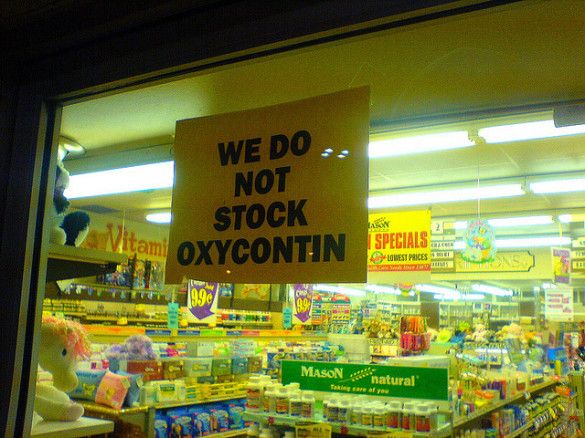Cops To Be Armed With Anti-Overdose Pills In New Pilot Program

The scourge of prescription painkiller abuse across the country continues to rise, and the mayor’s office and the NYPD are instituting a new pilot program in an effort to prevent fatal overdoses. Politicker is reporting that cops in Staten Island, where prescription painkiller abuse is the worst in the city, will be armed with anti-overdose medication to administer to people who are overdosing.
The statistics surrounding prescription pill abuse are alarming. Politicker reported that between 2000 and 2011, overdose deaths linked to prescription painkillers skyrocketed 267 percent, with 190 dying in 2012 alone. The new pilot program is starting in Staten Island because overdoses from the result of prescription painkillers are three times higher than other boroughs. Bloomberg explained the simple of idea behind the program:
“We’re trying to give some police officers an antidote for overdose because the cops show up and somebody’s OD’ed … before a doctor can get there or an EMT,” said Mayor Michael Bloomberg, who announced the plans on his weekly radio sit-down with WOR’s John Gambling. “Sometimes,” he added, “people can die.”…
“They’ve become a substitute for narcotics and it is an enormous problem,” he said, noting cases where people have held up drug stores or held up people leaving drug stores in search of pills.
Police Commissioner Ray Kelly agreed that arming officers with naloxene, a nasal spray that serves as an anti-overdosing agent, might go a long way to save lives.
“Equipping officers to administer naloxene to overdose victims may mean the difference between life or death for individuals addicted to prescription painkillers.”
Politicker also noted that this latest initiative is part of the city’s greater effort to battle prescription painkiller abuse:
The new program is part of a larger effort by the city, which has been awarded the first grant of its kind from the Department of Justice to continue cracking down on the pills. The city also announced today that 35 hospitals have now adopted the voluntary restrictions limiting the number of opioid painkillers their emergency rooms can prescribe.
Bloomberg’s effort to curtail hospitals from offering too many painkillers was met with controversy as critics worried that it would punish poor and uninsured patients who use the emergency room as their primary care center. Bloomberg countered these arguments in an earlier Politicker report:
“The city hospitals we control, so … we’re going to do it and we’re urging all of the other hospitals to do it, voluntary guidelines. Somebody said, oh, somebody wrote, ‘Oh then maybe there won’t be enough painkillers for the poor who use the emergency rooms as their primary care doctor,’” the mayor said on his weekly radio show with John Gambling. “Number one, there’s no evidence of that. Number two, supposing it is really true, so you didn’t get enough painkillers and you did have to suffer a little bit. The other side of the coin is people are dying and there’s nothing perfect … There’s nothing that you can possibly do where somebody isn’t going to suffer, and it’s always the same group [claiming], ‘Everybody is heartless.’ Come on, this is a very big problem.”…
“We talk about drugs, heroin and crack and marijuana, this is one of the big outbursts–and it’s a lot worse around the country than it is here. It’s kids and adults getting painkillers and using them for entertainment purposes, or whatever field of purposes, as opposed to what they are designed for,” he explained. “If you break a leg, you’re going to be in pain, nothing wrong with getting something that reduces the pain. But if you get 20 days worth of pills and you only need them three days, there’s 17 days sitting there. Invariably some of the kids are going to find them, or you’re going to take them and get you addicted.”



